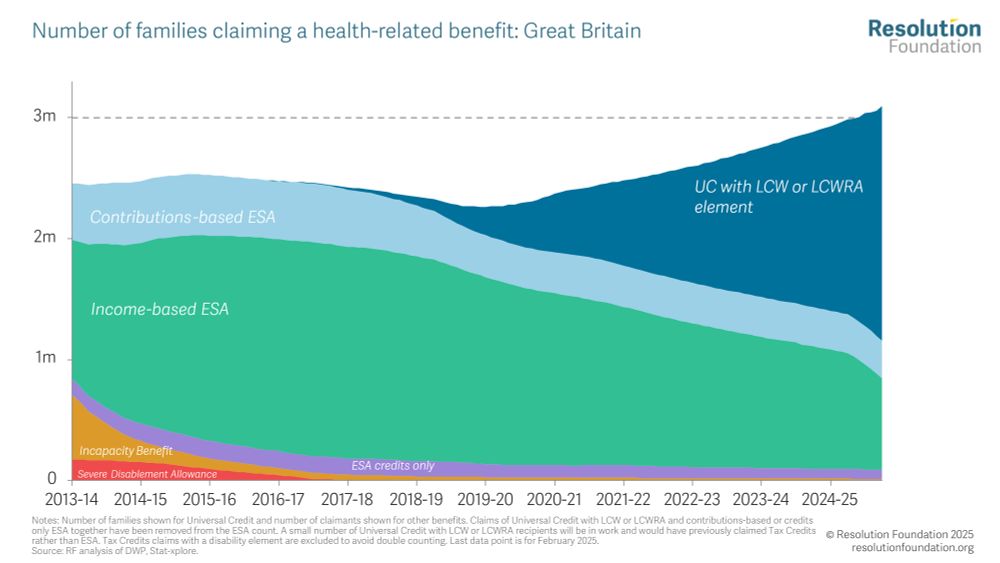
The DWP employer survey figures quoted are in chart 3.18 of: www.gov.uk/government/p...
03.11.2025 19:30 — 👍 0 🔁 1 💬 0 📌 0@lauradewar99.bsky.social
Freelance Policy Researcher and Head of Research at Belina Grow CIC

The DWP employer survey figures quoted are in chart 3.18 of: www.gov.uk/government/p...
03.11.2025 19:30 — 👍 0 🔁 1 💬 0 📌 0
New today from DWP: Claims that just one in five employers have engaged with Jobcentre Plus. Actually, it's worse than that - the DWP employer survey says most of the contacts are about workplace pensions, apprenticeships (then not DWP), child support and disability issues, not JCP services.
03.11.2025 19:26 — 👍 4 🔁 4 💬 1 📌 1This analysis is useful and I agree that tax should be more consistent. However, having two young adult children in rental accommodation, I fear that landlords will just pass on the extra tax to those that rent their properties.
13.10.2025 16:16 — 👍 0 🔁 0 💬 0 📌 0BREAKING NEWS: Major boost in funding to support sick and disabled people back into work.
Today I'm announcing a £167 million investment in Connect to Work.
Instead of just using Jobcentres, we're putting specialist employment advisors in GP surgeries to support people back into work.

Chart showing: Number of families claiming a health-related benefit: Great Britain
Of course, researchers try to make sense of this by collating lots of different DWP data releases...
But we shouldn't expect journalists to do this every month. Until DWP publish their data more clearly, we shouldn't be surprised if misleading and unforgiving headlines keep coming.
This is also not helped by the Universal Credit rules meaning claimants must have savings below £6,000.
06.10.2025 10:36 — 👍 0 🔁 0 💬 0 📌 0An interesting analysis by the RF. But what of the overall benefit cap? How will the change in the two child policy impact those affected by the benefit cap (the overall amount that claimants can receive in benefits). Does the change assume that both policies will be abolished?
02.10.2025 16:16 — 👍 2 🔁 0 💬 1 📌 0
Getting more parents into work helped reduce child poverty for the last Labour government, but Britain is different today.
New analysis reveals why the Government will need deep pockets, and action on employment, housing & benefits to lift more children out of poverty
⤵️ https://buff.ly/4iZATds

Mike Brewer, Interim Chief Executive of the Resolution Foundation, said: “Getting more parents into work played a major role in reducing child poverty during the last Labour government. “But Britain today is very different – most families in poverty have at least one person in work, with those that are still workless facing significant barriers to employment. “The Government’s new child poverty strategy will need to confront these challenges, which require action across a broad front. As well as the obvious moves, like boosting childcare support – particularly for primary-school-aged children – and making it easier to commute between workplaces, schools and nurseries, strengthening workers’ rights should help reduce the risks involved in changing jobs. “With many of the ‘easy gains’ on poverty reduction achieved, the Government will need deep pockets, and action on multiple fronts across employment, housing and benefits, to lift significantly more children out of poverty.”
New analysis from @mikebrewerecon.bsky.social & @alexclegg.bsky.social examines the role employment could play in a child poverty strategy.
This is in the context of single-earner couples seeing their risk of falling into poverty rise by a third since 2000.
Learn more ⤵️ https://buff.ly/4iZATds